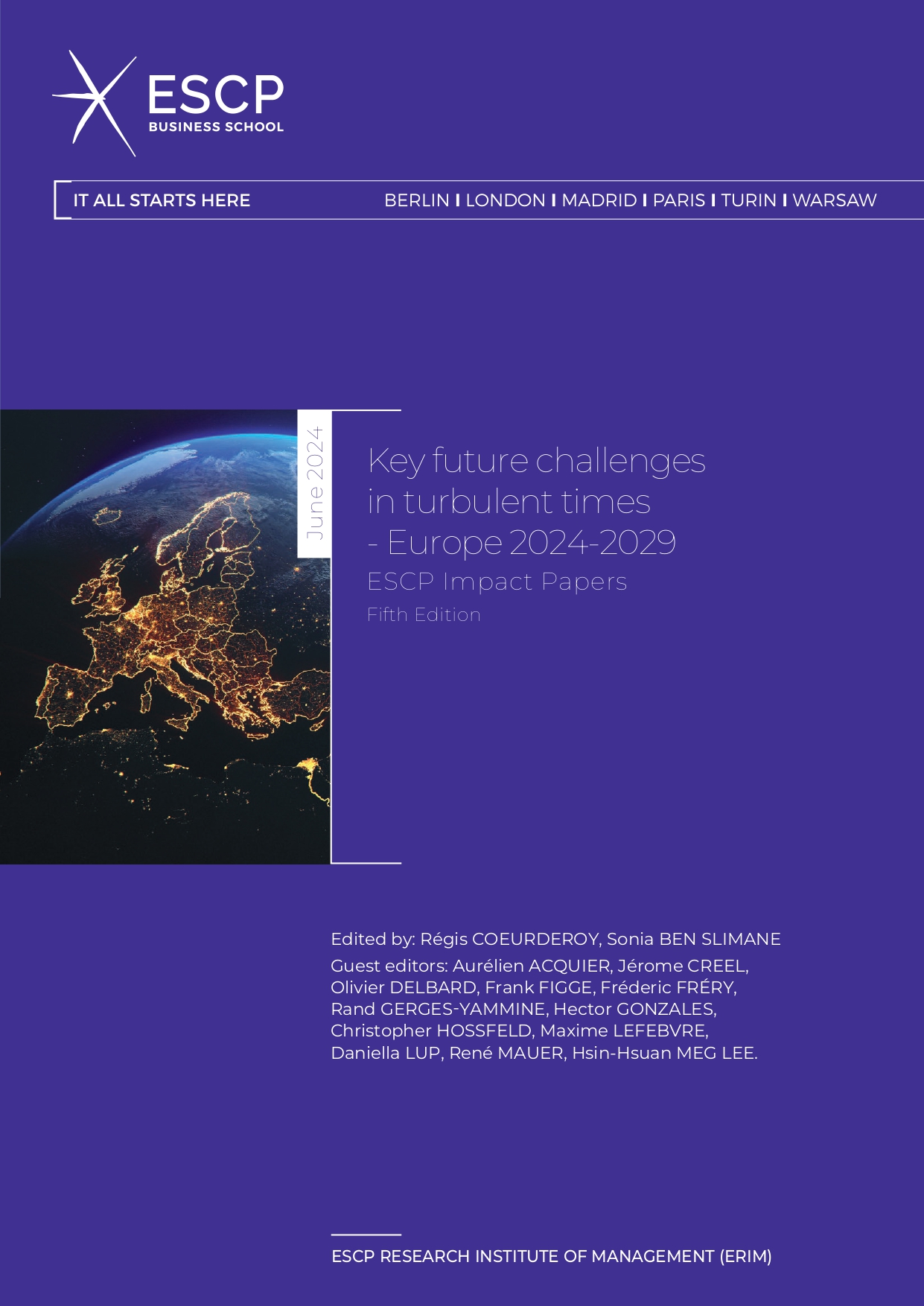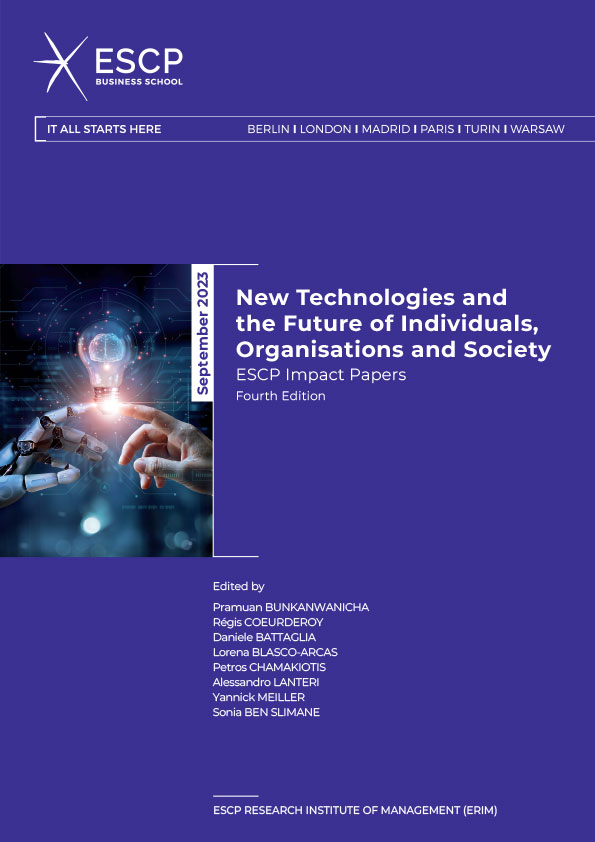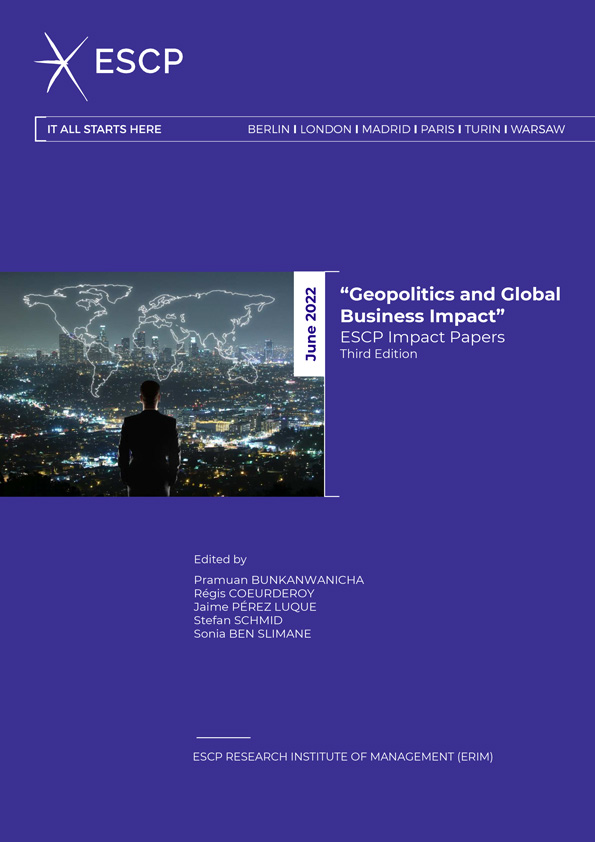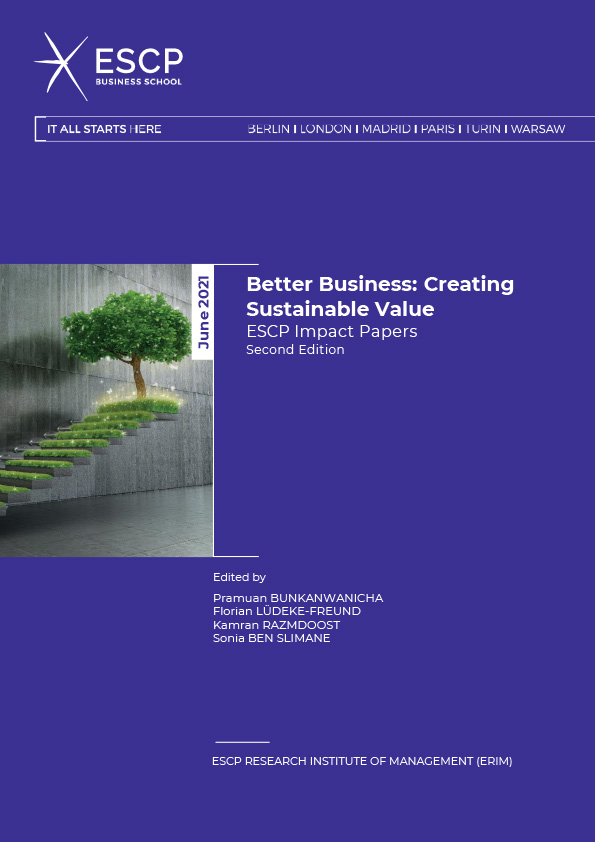Research

Régis Cœurderoy
Associate Dean for Research
ESCP has a research strategy of scientific excellence and of knowledge transfer.
Our faculty’s research not only gives rise to publications in the most prestigious international and national scientific journals but also contributes to nourishing, via reference works or "transfer" publications, both the professional community (companies, public authorities, professional associations, etc.) and the teaching content of all programmes in order to provide our students with the latest knowledge and insights.
Research at ESCP can be classified along three main axes: the classical axis of creating models explaining managerial practices or behaviour, a phenomenological axis aiming at a clearer understanding of the practices and beliefs of the business world, and a societal axis seeking to guide public policy and to offer a critical view of the professions and disciplines of management and economic sciences.
Headed by the Associate Dean of Research and the European Research Committee, research at ESCP is increasingly conducted through our various Research Centres, Laboratories, Chairs and Institutes. A "capacitating" policy helping faculty members to pursue their research and achieve their publication objectives is applied. Internal democratic and scientific evaluation processes help to support the best research projects within the three axes explained above.
Research covers fields such as classical business functions: finance, marketing, and strategy but also business history, energy management, entrepreneurship, health management, public management, responsible management, or the epistemology and critical analysis of the business world. A particular interest is put on intercultural research topics.
ESCP strongly encourages cross-campus research where teams of professors in our different locations work together on research topics. Faculty’s research is also powered by our PhD students on our Berlin and Paris Campus. We also increasingly support transversal research conducted with other disciplines than management.
Régis Cœurderoy
Associate Dean for Research
ERIM
ESCP Research Institute of Management
The “ESCP Research Institute of Management” (ERIM) research unit is part of ESCP’s strategy of “impactful” research activity by federating ESCP faculty activities with targeted “key research themes” drawn from existing and emerging fields of expertise.
The aims are to raise the profile of the research activity of the ESCP faculty, encourage the development of new opportunities for national and international collaboration, and strengthen research through training, particularly at doctoral level, in order to attract more students wishing to carry out a doctoral project under ESCP's doctoral programme.
Ethics compliance statement
"ESCP Business School and its faculty members seek to strengthen the culture of scientific integrity and fully commit themselves on institutional and individual levels to following the guiding principles of good research practice set out by the national and European standards for research work:
• “Code of Conduct: Guidelines for Safeguarding Good Research Practice” , German Research Foundation (DFG);
• “Research ethics guidance” , Economic and Social Research Council (ESRC);
• “Ethics in research” , Spanish National Research Council (CSIC);
• “Charte française de déontologie des métiers de la recherche ” , CNRS Ethics Committee (CNRS)
• “Guidelines for Research Integrity” , Research Ethics and Integrity Committee, National Research Council (CNR)
• “Ethics in Social Science and Humanities” and “Ethics and Data Protection”, European Commission, DG Research and Innovation.
LIGhTS Research Institutes: Advancing Knowledge and Innovation for Societal Impact
Research institutes serve as interfaces between academia, industry, and public policy, ensuring that scholarly inquiry remains engaged with the pressing transformations shaping contemporary society. Rather than operating in isolation, the institutes are conceived as platforms for interdisciplinary collaboration, fostering exchanges between researchers, business leaders, policymakers, and civil society actors. By addressing five pivotal themes — Leadership & Inclusive Management, Innovation & Entrepreneurship, Geopolitics & Business, Technology & Deep Tech, and Sustainability—the LIGhTS framework positions ESCP at the forefront of applied research, contributing both to theoretical advancements and to the formulation of practical responses to global challenges.
Research Centres
Research centre
Research centres are communities dedicated to the pursuit and development of a particular research focus. Each centre is led by a full faculty member and has a scientific committee which includes external members (university researchers, consultants and industry representatives). A centre will answer research bids, develop its own finances for a programme of research and organise a programme of seminars and workshops.
Impact Papers Initiative
Research at ESCP Business School envisions a unique and dynamic environment. We are very proud of launching our “ESCP Impact Papers” research initiative aimed at providing insights into management knowledge that is applicable to not only practicing managers, but also other stakeholders, namely the European community, students and society.
Artificial Intelligence for Impact: Creativity, Ethics & the Future of Business
2025 – Sixth Edition
After five editions tackling disruption, innovation, and societal change, ESCP’s Impact Papers turns to one of the most transformative forces of our time: Artificial Intelligence.
The sixth volume of the Impact Papers, Artificial Intelligence for Impact: Creativity, Ethics, and the Future of Business, brings together 48 contributions from ESCP faculty and guest authors across disciplines and campuses. Collectively, they examine how AI is reshaping leadership, entrepreneurship, sustainability, and the human dimensions of work and decision-making while challenging organisations to align technological progress with creativity, ethics, and responsibility.
Edited by Prof. Régis Coeurderoy and Dr Sonia Ben Slimane, with guest editors Isabella Maggioni, Louis-David Benyayer, Marie Taillard, Sylvain Bureau, and Yi Yang, the volume bridges research and practice through case studies, conceptual essays, and forward-looking analyses. Continuing the mission of the Impact Papers, this edition ensures that academic research not only interprets global change but actively informs how businesses and societies respond.
This collection embodies how AI can become a force for positive impact when guided by creativity, responsibility, sustainability, and inclusion. Prof. Léon Laulusa, Dean and Executive President, ESCP
KEY FUTURE CHALLENGES IN TURBULENT TIMES - EUROPE 2024-2029
2024 – Fifth Edition
After four successful and impactful editions, made possible thanks to the valuable involvement and contributions of our faculty members, PhD students as well as external contributors, we are glad to introduce this 5th edition of ESCP IPs.
The fifth edition was launched with the flagship title: “Key future challenges in turbulent times - Europe 2024-2029”. We are facing an unprecedented time of economic, social, environmental and technological challenges. These challenges are mainly seen through a series of crises. They also give rise to new thinking on a forward-looking and operational basis for big challenges in the near future.
The Impact Papers
The breakdown of the number of contributions for this 5th edition both in English and French, following the LIGHTS under the hat context of the Future of Higher education is as follows: Future of HEI (15), Leadership (8), Innovation and Entrepreneurship (6), Geopolitics (8), Geo-economics (7), Human resource management/well-being/workplace (11), Technology (8) Sustainability (12) for a total of 76 contributions.
The papers gathered for this fifth edition of the ESCP Impact Papers series address a range of challenges and opportunities in the identified LIGHTS topics, to create sustainable value. Specifically, they discuss the latest advances in knowledge of sustainability-related issues, including business philosophy and business value, corporate activism, the role of technology, new business models and sustainable value chains, people, their wellbeing and their prosocial behaviour, as well as pedagogy and the role of business schools in educating future responsible leaders.
Finally, this impact series is a collective effort by the ESCP community as it takes one step further in having a positive impact on business, society and policy.
New Technologies and the Future of Individuals, Organisations and Society
2023 – Fourth Edition
After three successful and impactful editions, marked by their alignment with macroeconomic, social and environmental challenges, the fourth edition focuses on emergent and future technological challenges. We have been living in a rapidly changing world of technological disruptions driven by the digital revolution. Many researchers have identified tensions between benefits and challenges arising from technological innovation for organisations (on one hand) and individuals (on the other hand).
At the organisational level, emerging technologies imply more opportunities to compete in fast-moving contexts, but also implementation challenges in incorporating them to their business processes. AI technologies are transforming our lives. The AI-based chatbot known as ChatGPT illustrates how new technologies allow us doing things at an exponential pace and with efficient results.
However, these technologies call for a comprehensive and nuanced exploration of this transformation. It is particularly important to focus our attention on human, ethical and regulatory and aspects, to avoid losing human control:
Success in creating AI would be the
biggest event in human history.
Unfortunately, it might also be the last,
unless we learn how to avoid the risks.
The Impact Papers
This 4th edition aims to explore all the B.E.S.T dimensions of impactful research strategy at ESCP Business School (Business, European and worldwide, Societal and environmental, and Teaching), through multi-disciplinary contributions, based on the expertise and experience of the ESCP faculty, thus stimulating creative ideas and innovative perspectives that could inspire our many stakeholders. The underpinning idea is to investigate the following under-explored question: What will the implications of new technologies be from a holistic perspective and across the various levels of impact?
As for the previous editions, this 4th edition of ESCP IPs is very open and reflects the diversity of expertise within the faculty. We have grouped the contributions under thematic headings that fall within the principles of our B.E.S.T strategy: Business, European, Societal, and Teaching.
The topic is still emergent, it represents an introductive avenue for further research and interest for academics and broader stakeholders.
The breakdown of the number of contributions for this 4th edition following the B.E.S.T strategy is as follows: Business (14), Europe (9), Societal (5), Teaching (2), for a total of 30 contributions.
Geopolitics and Global Business Impact
2022 – Third Edition
Many observers consider that the process of globalization that has characterized these past decades has stalled, or may even be in retreat. This is, for instance, reflected in the resurgence of debates on the increasing role of national political and regulatory institutions within the development of economic activities. Recent events also show us that geopolitical issues are once again central to business activity and its future development.
The objective of this series is to explore from various angles how geopolitical issues can influence the strategies of companies and their managerial practices at the international and national levels– not only as potential risks (the “dark side”) but also as opportunities for innovation and societal change (“the bright side”).
Business and the socio-political arena are intimately entwined and influence each other mutually, contradicting Fukuyama’s famous claim that we are not at the end of history. In particular, the most recent militarized conflicts in Eastern Europe dramatically remind us that business and management challenges are embedded in economic, political and societal issues. Business is not a world apart but contributes to the question of making sense of human activity.
In calling for contributions, the aim was to encourage the ESCP academic community to reflect and generate insights on the complexity and the uncertainties of a multi-polar world and how management can help tell a story in a world “full of sound and fury”.
Life's but a walking shadow, a poor player,
That struts and frets his hour upon the stage,
And then is heard no more. It is a tale
Told by an idiot, full of sound and fury,
Signifying nothing.
 William ShakespeareMacbeth
William ShakespeareMacbethThe Impact Papers
ESCP’s academic community has played a significant role in advancing academic knowledge on how businesses engage with economic, social and political issues. This call for papers focus on geopolitical topics from a variety of perspectives. More generally, the objective has been to explore the interconnections between the business and socio- political worlds. Varieties of topics have been proposed, including:
- The future of globalization
- Sovereignty in business
- International relations in a changing environment
- Imperialism and neo-imperialism
- Trade and foreign direct investment
- War, peace and business
- Firms as political actors
- Managing geopolitical risks
- The future of corporate globalization
- Disinvestment and deinternationalization
- MNEs and government relations
- Geopolitics and the European context
- Business and democracy
- Geopolitics and financial markets
- Geopolitics and sustainability challenges
- Geopolitics and artificial intelligence
- Geopolitics and management control
- Geopolitics and HR management
- Geopolitics and real estate
- Geopolitics in curricula of universities and business school
We follow the same principles of the first two editions of ESCP Impact Papers, the contributions having been gathered within the B.E.S.T. Impact framework (Business, European, Societal, and Teaching). The breakdown of the number of contributions for this third edition following the B.E.S.T strategy is as follows: Business (16), Europe (13), Societal (3), Teaching (1) for a total of 33 contributions.
Better Business: Creating Sustainable Value
2021 – Second Edition
Businesses are engaging in a number of activities throughout their value chains in order to address social and environmental issues. This has been expected of them for many years now as part of their responsibility and accountability towards their stakeholders.
More specifically, the increasingly widely-debated idea of sustainable value creation makes businesses accountable for generating economic value while causing less harm to society and the environment (i.e., the triple bottom line) or, in the best case, no harm at all (i.e., strong sustainability). Some businesses are taking bold steps to make addressing a social or environmental cause their key purpose. They tie their identity to such causes and act as leaders in their markets, proactively working towards solutions to diverse sustainability challenges.
This is no longer limited to social enterprises and non-governmental organisations; private- sector businesses are increasingly joining social movements to address complex, multi- layered global challenges. In other words, businesses are moving away from being a cause of social and environmental problems, to being part of the solution.
This approach points to forms of hybridisation of organisational purposes and designs, and is still in its infancy. Nevertheless, major players, including policy makers, international corporations, and business schools such as ours, have understood that creating sustainable value is a purpose that is necessary and worth striving for.
The Impact Papers
The ESCP research community from all disciplines has shown strong support for this theme. We received 61 manuscripts, and 54 papers were accepted and finalised for the Impact Papers series in the review process.
The final set of papers shows a diverse range of topics across the departments of Management (18 papers), Marketing (10), Finance (7), Information and Operations Management (6), Entrepreneurship (5) and Law, Economics and Humanities (4). We also have four papers written by colleagues collaborating across departments.
The papers gathered for this second edition of the ESCP Impact Papers series address a range of challenges and opportunities for businesses to create sustainable value. Specifically, they discuss the latest advances in knowledge of sustainability-related issues, including business philosophy and business value, corporate activism, the role of technology, new business models and sustainable value chains, people, their wellbeing and their prosocial behaviour, as well as pedagogy and the role of business schools in educating future responsible leaders. The impact papers build strong arguments around these issues, providing evidence and illustrations.
The contributions map out some of the key issues businesses are facing in their transition towards creating sustainable value. The papers also point towards some of the key initiatives and solutions that can help them achieve this goal.
Finally, this impact series is a collective effort by the ESCP community as it takes one step further in having a positive impact on business, society and policy.
Managing a Post-Covid19 Era
2020 – First Edition
The first edition of ESCP Impact Papers on “Managing a Post-Covid19 Era” demonstrates how our incisive researchers could react to addressing several insightful, on-time challenges that help further reflections, to better prepare for the possible changes on the future of business and society following this unprecedented, disruptive pandemic.
As part of the collective mobilization of ESCP’s faculty as well as Ph.D. students and affiliate and emeritus professors across campuses, in June 2020 ESCP published 80 impact papers within the four pillars of the B.E.S.T research-for-action framework (Business impact, European impact, Society impact, and Teaching impact). The first series of ESCP Impact Papers covered a wide range of topics such as the potential changes in consumer behaviour, the organizational challenges for management and leadership, or the strategic and financial issues in the markets that this coronavirus crisis may generate.
The Research Ethics Review Committee (RERC)
Promoting the Implementation of Ethically Sound and Responsible Research Practices
The Research Ethics Review Committee (RERC) independently reviews research proposals from researchers affiliated to ESCP.
The RERC has the task of critical oversight of primary data collections involving human participants. Its remit is to approve/reject, monitor, and ask for modifications in research activities performed by ESCP faculty members involving human participants.
The application process
Before data collection of the project starts, ESCP faculty members, PhD students and generally, all researchers whose primary affiliation is ESCP can apply to the RERC process (in exceptional circumstances, researchers whose secondary affiliation is ESCP may also apply).
The RERC members hold meetings once a month.
After the review, there are three potential scenarios:
- Letter of approval: researchers are good to go and start collecting the data
- Letter of conditional approval: researchers need to implement some changes and resubmit their application
- Letter of rejection
The RERC reviews in particular:
- Research projects related to primary data collection performed by researchers of ESCP Business School
- Research project applications submitted to the ESCP Research Funding (ERF) programme involving data collection from human subjects (All researchers planning data collection from human subjects will have to submit an “Ethic Self-Assessment” along with their ERF-application)
- All other research activities, for which a member of the ESCP faculty seeks an official approval of the Research Ethics Review Committee or Institutional Review Board requested by e.g. a journal publisher, an international project partner or an external third-party funding body/agency.
The Research Ethics Review Committee Members
Reference Documents for Ethical Research
European Commission
European Charter for Researchers
“The European Charter for Researchers is a set of general principles and requirements which specifies the roles, responsibilities and entitlements of researchers as well as of employers and/or funders of researchers” […]
ALLEA
European Code of Conduct for Research Integrity
“The European Code of Conduct for Research Integrity serves the European research community as a framework for self-regulation across all scientific and scholarly disciplines and for all research settings” […]
Hcéres
French National Charter for Research Integrity
“The French National Charter for Research Integrity concerns all researchers […] who contribute to research activity and who undertake to respect the principles of integrity expressed herein” […]
DFG
Guidelines for Safeguarding Good Research Practice
“The purpose of the white paper Safeguarding Good Scientific Practice, published by the Deutsche Forschungsgemeinschaft (DFG, German Research Foundation), is to further research integrity and establish it as an integral part of research and teaching” […]
DFG
Code of Conduct “Guidelines for Safeguarding Good Research Practice”
“These guidelines underline the importance of integrity in the everyday practice of research and provide researchers with a reliable reference with which to embed good research” […]





















